________________
64
Jaina-Tarka-Bhāsā negative. The first is called non-availability of the contradictory and is of five types: non-availability of the effect contradictory to the probandum, non-availability of the cause contradictory to the probandum, non-availability of the nature contradictory to the probandum, non-availability of the determinant concomitant contradictory to the probandum and non-availability of a concomitant contradictory to the probandum. For example, this man is extremely sick because we do not find the activities of a man free from sickness. Here is trouble because the desired object is not available. The objects are multisided because the nature of onesidedness is not found. Here is shade because heat is not available. Here is false knowledge because right attitude is not available.
*55. The second is the non-availability of the non-contradictory which is of seven types : non-availability of the nature, non-availability of the determinant concomitant, nonavailability of the effect, non-availability of the cause, nonavailability of the predecessor, non-availability of the follower, non-availability of one which is simultaneous. For example, 'here is no pitcher on the earth because there is no availability of its nature which is due if it were available. There is no panasa(Artocarpus integrifolia) because there is no tree available. This seed is not with its power unobstructed, because a sprout is not seen in it. He has no peacefulness etc. because there is no faith in the true nature of things. Svāti will not arise after a moment because the rise of citrā is not seen. Pūrvabhādrapada did not rise a moment before because we have no knowledge of the rise of Uttara-bhadrapada. He has no right knowledge because we do not find any right attitude. Thus, though of many types, the cause is characterised by the only quality of not being coherent otherwise, and other than that are fallacies.
[20. Description of fallacies.]
*56. This fallacy is three-fold: unproved, contradictory and inconclusive. That whose nature is not determined is unproved. Indetermination of knowledge is either through ignorance or through doubt or through perversion. It is two




